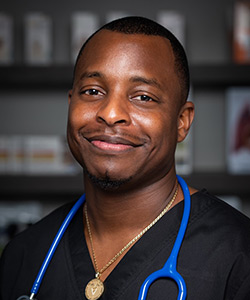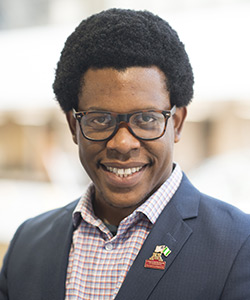How representation can empower Black excellence
Interviews by R. Scott Nolen
In honor of Black History Month this February, AVMA News spoke to Black veterinarians from across the profession about the value of diversity, equity, and inclusion (DEI) within veterinary medicine, how they try to inspire future generations of veterinarians, and ways they honor their heritage. The answers have been lightly edited for clarity and brevity.
Dr. Rachel Cezar-Martinez, U.S. Department of Agriculture (USDA) veterinarian, responds:
Q. Tell me about your job.
A: My full-time position is being the USDA’s federal overseeing veterinarian for Mississippi and Louisiana. I ensure these two states have staff and funding resources available to prevent infectious animal diseases and promote livestock production. I provide outreach and education to the public, especially veterinary students in the event they may become interested in joining us.
Q. What do you do to celebrate Black History Month?
A: I guess you would say I celebrate by embracing the culture of Creole (a person of mixed European and Black descent) cowboys and cowgirls by promoting the Courir de Mardi Gras (local Mardi Gras) festivities in Louisiana. The Mardi Gras holiday usually falls around the same time as Black History Month, and one way we celebrate both is by having a traditional horse trail ride and chicken run parade followed by a gumbo feast and Zydeco dance.
Q. Why does representation matter?
A: Representation means everything to me, because we live in such a diverse world, and it only makes sense that all cultures and backgrounds have the same opportunities. Usually, I have been the only person like me in a crowd or audience, and I’ve known some who have shied away from being that only one. However, if we don’t make those beginning footsteps, no one may follow. So, as a leader in my profession, I rise to the occasions to be the first, so others will not be fearful to continue down the same path of success and happiness.
Q. When did you want to become a veterinarian?
A: Ever since I was 6 years old. But even more, when we had a veterinarian come out to look at our horse. She was 4’11” and not afraid of anything. I said to myself, ‘Man, I want to be her one day!’
Q. Who else has inspired you?
A: Many have inspired and helped me along my path to becoming a veterinarian, and I truly believe it takes a village. However, I give credit to my parents, always, because they raised me not to give up and not to shy away from adversity. They taught me to respect and accept all people and their differences.
Q. What do you do to inspire others?
A: I take time to listen first and cheerlead others who aspire to be more and to do more and don’t give up. I enjoy attending outreach events at schools and conferences to promote our profession as well as being an adjunct professor for a local community college. With my family, we have an educational animal farm. We hope to have many come over when the weather gets nicer and learn the amazing things about animals and maybe even pursue a career with animals.
Dr. Diarra Blue, veterinary practice owner and one of the stars of Animal Planet’s “The Vet Life,” responds:
Q. Tell me about your job.
A: My day-to-day job is just being Dr. Doolittle—working with dogs and cats and sometimes with pigs and goats. Every now and again, I’ll get an exotic. I’m doing everything from preventive care to sick examinations, dealing with diabetics and also doing surgery.
I think the biggest part of my job as a veterinarian is the day-to-day care, but then as an entrepreneur and as an owner of four veterinary hospitals, it's really the get in the trenches with the business: writing protocols, hiring, training the staff, making sure that we're having a business that is amenable to our clients. It’s making sure that they're having a great experience and then making sure we have things in place for our patients so that we can provide the best care possible.
Q. What do you do to celebrate Black History Month?
A: The biggest thing that I do to celebrate, honestly, is I talk to my children about Black members of society throughout history—whether it be American or African or any history—about things that they did. They don't get a lot of teaching or education about Black figures at school, so I make sure that they know about more than just Malcolm X, Martin Luther King Jr., Elijah Muhammad, and Marcus Garvey. They learn a little bit more in depth about those Black individuals who really played a role in our society. And for me, as a scientist, it’s also important that I talk to my kids about those Black figures in that field. Since becoming a baby icon in the veterinary world, I will do a lot of posting and reposting of interviews I’ve done on Animal Planet.
Q. Why does representation matter?
A: Representation is so important on several levels. Let’s talk about the future. The statement, ‘If you can’t see it, you can’t be it,’ so it’s important that I show young Black people that they can be veterinarians. Where I come from, there was a saying that football, basketball, and rap is all we have. So, to see a veterinarian of color, it’s an opportunity for children to see they can be something else.
I’m from Detroit, and there’s a pair of glasses made by Cartier that are very popular there. Detroit, Michigan, put these glasses on the map. And one of the first things that I did when I was on Animal Planet was I wore those glasses, specifically for the people of Detroit to show them that you can be a veterinarian and wear them. That was literally a vision of mine. So that's the reason why representation is important.
Q. When did you want to become a veterinarian?
A: It was a God-given desire, so all my life. When I say 2-years-old, a lot of people say you can’t know anything when you’re 2, but I always knew.
Q. Who inspired you?
A: No. 1, my mother and father always had a love for animals. We had nine dogs growing up. My mother and father used to show Staffordshire Bull Terriers at AKC dog shows. We were one of the few and first Black families in Detroit with that breed of dog. My mother was very much in tune with animals. So that was a part of it. The biggest influence outside of my family and desire is Jack Hanna. He was good with animals, and I used to love watching him on TV on Saturday mornings. My parents fed into that, and they’d buy me encyclopedias and books to read about animals.
Q. What do you do to inspire others?
A: Because of my TV show, I’ve spoken at several universities and other venues. This one time, a person walked up to me after one of my presentations, and said, ‘Dr. Blue, I became a veterinarian because I used to watch you on TV when I was younger, and I saw you could be a Black veterinarian.’ I’m not an emotional person, but it almost brought me to tears.
I used to speak at about eight events a year, now I do about three. I do interviews. I’m active on social media. My show is syndicated on reruns. I also bring in interns to my practices, anywhere from 15 to 20 every year.
Dr. Bobwealth Omontese, adjunct professor at Tuskegee University College of Veterinary Medicine (TUCVM), responds:
Q. Tell me about your job.
A: I support the theriogenology program at Tuskegee, teaching large animal reproduction and supporting related animal welfare learning activities. I work mostly with dairy and beef cattle producers and provide reproductive ultrasound training services in cattle, sheep, and goats. My work supports producers who desire to improve their herd genetics and use fertility management programs.
Q. What do you do to celebrate Black History Month?
A: There are several activities planned to celebrate Black History Month at Tuskegee and I plan on attending those. Tuskegee’s veterinary college has a unique history in the education of Black veterinarians. Our college is recognized as the most diverse college of veterinary medicine, being located on the campus of a historically Black college or university (HBCU) in the U.S. Importantly, TUCVM has educated upwards of 70% of the nation’s Black veterinarians in North America. That’s huge.
Q. Why does representation matter?
A: Firstly, representation in the veterinary profession signifies the presence and active participation of diverse groups or individuals. It embodies the commitment to inclusivity, ensuring that diverse voices are heard and valued. It’s about creating an environment where members can work together to address the multifaceted challenges we experience as a profession.
I believe representation matters because the profession serves a diverse clientele, and so it is valuable for the composition of the profession to reflect the demographic diversity of our clients, encompassing aspects such as race, gender, and cultural backgrounds. This allows for a deeper understanding of, and sensitivity to, varied cultural norms, beliefs, and expectations, thereby enabling veterinarians to provide care that is both culturally competent and responsive to the specific needs of the clients and their animal patients.
In addition, representation in the veterinary profession is crucial for inspiring the next generation of veterinarians from underrepresented communities by providing role models and affirming that career success in the profession is possible. This, in turn, can enrich the profession with diverse talents and insights.
Q. When did you want to become a veterinarian?
A: I was about 10 or 11 when my parents noticed I had a very keen interest in playing with animals. I would request to go to a farm that raised sheep, goats, and cattle.
Initially, I wanted to be a medical doctor, but my parents said, ‘Maybe you should consider being a vet. We see you really like four-legged animals. You might want to consider that path.’ And I did!
Also as a teenager, I had an opportunity to speak with a veterinarian about my interest in working with animals. He encouraged me to pursue my dream and apply to veterinary school. After I got in, I became very interested in the biology of animal reproduction. I knew I wanted to be someone who helps producers multiply their herd. I went on to graduate from Ahmadu Bello University Faculty of Veterinary Medicine in Zaria, Nigeria, and received my master’s and PhD in theriogenology from the same institution. Also, I completed a residency in theriogenology before proceeding to the University of Minnesota College of Veterinary Medicine for a postdoctoral fellowship.
Q. Who else has inspired you?
A: At every stage of my career, I’ve always had mentors who inspired me, including folks from both Nigeria and the U.S. To mention a few, Dr. Peter Rekwot at Ahmadu Bellow, Dr. Gerard Cramer at Minnesota, and, more recently, the dean of Tuskegee’s veterinary college, Dr. Ruby Perry. These mentors are always willing to engage, listen, and provide opportunities for growth.
Q. What do you do to inspire others?
A: This question drives at the heart of my work. Given the opportunity, I readily share my experiences and enthusiasm for the subject matter. My approach to inspiring others involves creating a safe learning environment that prioritizes hands-on experiences and encourages interaction. By placing others at the center of the conversation, I am able to foster active engagement and a deeper understanding of animal reproduction and welfare-related topics. Recognizing the growing interest in international veterinary practice among students, I have found that sharing unique experiences of my work both in Africa and the U.S. inspires others greatly. This keeps me very engaged and it’s an honor to be able to impact others in such a meaningful way.



